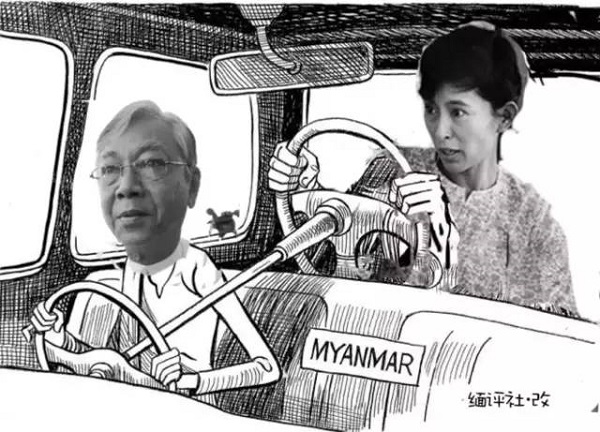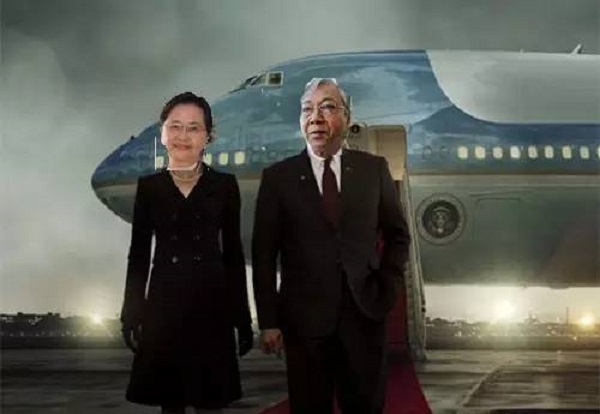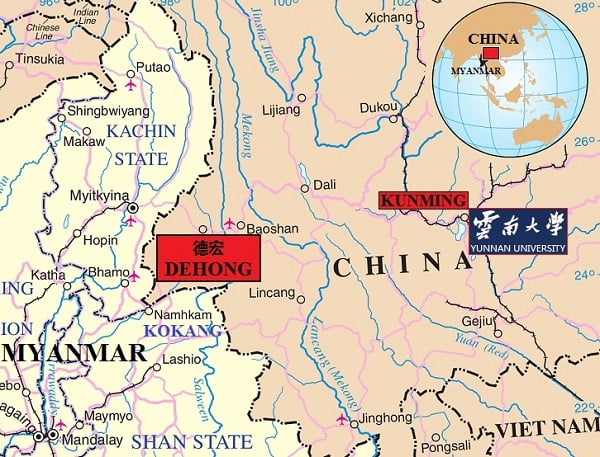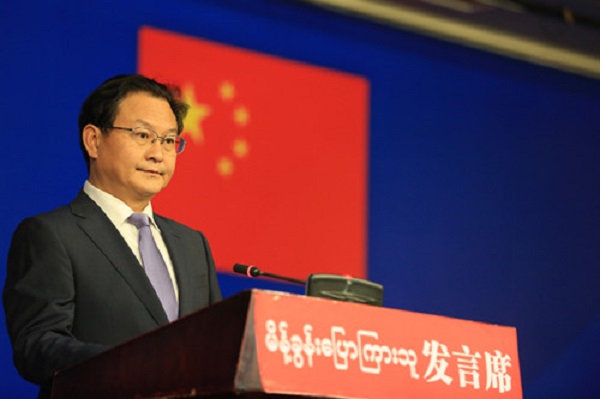
Blood Brother News (Myanmar), Mar. 12, 2016
Western reactions to Myanmar’s recent presidential election have differed sharply from those in China and in pro-Beijing Chinese media in Myanmar (formerly known as Burma). Western political leaders and media organizations have welcomed U Htin Kyaw as the country’s first democratically elected president in half a century.
In contrast, Chinese media and pro-Beijing media in Myanmar have viewed him with suspicion: as Aung San Suu Kyi’s (and by extension Washington’s) “crony” or “right-hand man.” An examination of the information and organizational pipeline between Beijing and its proxies in Myanmar provides an illuminating case study in how China seeks to exert influence outside its borders.
Baobo News is a Chinese-language news and propaganda network set up by the Chinese government for the ethnic Chinese community in Myanmar. Baobo, a Chinese variant of the Burmese Pauk-Phaw), is a Sino-Burmese expression usually translated as “blood brother,” referring to the blood link between ethnic Chinese on both sides of the China-Myanmar border, relying on ethnic Han nationalism and the understanding that “big brother” in the relationship is China. Baobo News repeated China’s harshest claims against Myanmar’s new president, including a crude cartoon of Aung San Suu Kyi as a “back-seat driver” to her “chauffeur” U Htin Kyaw.
Myanmar’s new president, whose name in Chinese is “Wu Tingjue,” has been referred to in Chinese media as the “crony,” “agent,” “male girlfriend,” and “right-hand man” of Aung San Suu Kyi. In turn, both are frequently portrayed as stooges of the West in its effort to “contain” Chinese influence in Southeast Asia. Aung San Suu Kyi has been described as a “mouthpiece for Western interests” and as “America’s ‘woman’,” attributing her political rise to U.S. “infiltration” purposed at harming Chinese interests (see also China Observer Network, People’s Liberation Army National Defense College, Utopia).
This fits an established pattern of Chinese suspicion regarding U.S. aims in Asia and in assisting the democratization process in Myanmar. The Communist Party of China (CPC) organizations such as the Central Committee’s International Department and government think tanks such as the China Institute of International Studies (CIIS) have described the U.S. role in Myanmar’s democratization as part of a broader strategy of containment against China, and have accused Western governments and NGOs of deliberately discrediting China in Myanmar (see also Baobo News, Golden Phoenix).
The possibility that Myanmar’s own people might wish to elect their leaders or express their opinions freely seems rarely to cross Beijing’s collective mind as anything more than an inconvenience to China and an unfortunate result of Western “infiltration.” CIIS deputy director Su Xiaohui even complained that the relaxation of censorship in Myanmar has made “negative voices more easily spread,” as though an authoritarian state like Myanmar’s former military junta is the only kind of state Beijing is capable of dealing with. Baobo echoed Beijing’s claims with another crudely doctored image, this time of Aung San Suu Kyi and U Htin Kyaw emerging from Air Force One, an obvious reference to their presumed relationship with the United States:

Blood Brother News (Myanmar), Mar. 12, 2016
Beijing’s “unease” or “anxiety” at the erosion of its influence in Myanmar has been noted by authors such as Prashanth Parameswaran and Sudha Ramachandran. For economic as well as political reasons, as Shibani Mahtani has also noted, China would like very much “to revive its sway in Myanmar” (see also Baobo News). As Myanmar’s government tilts Westward, however, popular anti-China sentiment has also risen, including local resistance to economic projects important to Beijing.
China’s willingness to meddle in Myanmar’s internal affairs extends to its involvement in ethnic conflicts in the northern Kachin and Kokang regions bordering the country’s southwestern Yunnan Province, and includes arming ethnic rebel groups and interfering in peace talks (see Jürgen Haacke; Irriwaddy; Toshihiro Kudo; Michael F. Martin; Mizzima, Mar. 5, June 2, Oct. 9, 2015; Maung Aung Myoe; Min Zaw Oo; Yun Sun, Asia Pacific Bulletin; Stimson Center).

Northern Myanmar – Yunnan Province, China border region (Wikimedia Commons, modified)
Baobo News was set up in April 2015 with the participation of China’s state-run Confucius Institute and the CPC Committee at Yunnan University’s Propaganda Department (Apr. 9, 2015). Baobo’s launch in Mandalay was attended by dignitaries including Chinese consul-general Wang Yu, Confucius Institute and Yunnan University officials, and representatives from various Sino-Burmese “friendship associations” that function among ethnic Chinese in Myanmar as front groups for the Chinese government, including Wu Bomin, chairman of the Mandalay Sino-Burmese Friendship Association.
The details of Baobo’s founding and continued operation fit a pattern of Chinese soft-power “covert ops” in Myanmar and globally. One detail specific to Myanmar is Beijing’s use of Yunnan Province—particularly Yunnan University, and Dehong Prefecture bordering northern Myanmar’s Kachin State—as a “forward base” given its geographical proximity, cultural, and economic ties to Myanmar. In September 2015, Yunnan University also hosted Mandalay Sino-Burmese Friendship Association chairman Wu Bomin and vice-chairman U Kyaw Win for meetings with Confucius Institute and university officials. Yunnan local CPC Committees and their propaganda departments, particularly at Yunnan University and in Dehong, Southeast Asian and Chinese “nationalities” studies centers around China, and the Confucius Institute feature prominently in Chinese media reports on Beijing’s activities in Myanmar (See also Toshihiro Kudo; Mizzima, June 2, 2015).
A further pattern in China’s global behavior exemplified in Baobo is China’s aggressive media strategy abroad, including co-optation of existing media or creation of new pro-Beijing media, especially for Chinese-language audiences (Center for International Media Assistance, Oct. 2013; Feb. 2015; Jan. 2016; Sarah Cook). Also in attendance at Baobo’s April 2015 launch were representatives from other Sino-Burmese news and propaganda organizations, including Golden Phoenix and the Burma Chinese Network, which likewise advance an unmistakably pro-Beijing viewpoint. The desired effect of such efforts in Myanmar is crystallized in the concept of cross-border Chinese as baobo or “blood brothers,” emphasizing patriotic identification with China, and overriding any such identification with the sovereign state of Myanmar.
Still another pattern exemplified in Baobo is coordination of efforts among officials from CPC propaganda and “overseas Chinese” or “compatriots” affairs (Qiaowu) offices under the Overseas Chinese Affairs Office of the State Council in Beijing, to try and co-opt ethnic Chinese communities abroad for use as instruments of mainland Chinese foreign policy. Often these organized efforts take the form of Chinese “chambers of commerce,” or of “friendship” or “peaceful reunification” associations, which pose as community organizations while functioning as front groups for the Chinese government in ethnic Chinese communities around the world. Examples of these in Myanmar include the Mandalay Sino-Burmese Friendship Association, noted above, China-Myanmar Friendship Association (CMFA), Myanmar-China Friendship Association, and Myanmar Chinese Chamber of Commerce.
In addition to CPC propaganda and Qiaowu offices, these “friendship” and “peaceful reunification” associations frequently report to the party’s United Front Work Department (UFWD). The UFWD is charged with overseeing relations between the CPC and non-party groups both inside and outside China, and with bringing these groups globally under CPC “leadership” on issues ranging from the status of Taiwan and Tibet to trade policy to Beijing’s worldwide persecution of Chinese religious and political refugees. China’s “peaceful reunification” associations around the world, additionally, report to the China Council for the Promotion of Peaceful National Reunification in Beijing.
In September 2013, Chinese and Sino-Burmese leaders met in Yangon for the Seventh Worldwide Myanmar Overseas Chinese Conference. Sino-Burmese officials in attendance at the conference included China-Myanmar Friendship Association vice-chairman Geng Zhiyuan, Myanmar-China Friendship Association president U Sein Win Aung, and Myanmar Chinese Chamber of Commerce president Lai Songsheng. Chinese officials in attendance at the conference included He Ruli, deputy secretary of the Dehong Prefecture CPC Committee and UFWD secretary.

He Ruli (Yunnan CPC Provincial Committee United Front Work Dept., Jan. 2016)
He Ruli served as Dehong UFWD secretary from August 2013 until he was promoted in August 2015 and replaced by Huang Liyun. Then in January 2016, He Ruli wrote at length for the Yunnan Provincial Committee UFWD on Dehong’s strategic location for cross-border activities and on specific Dehong CPC and UFWD activities with China’s “blood brothers” in Myanmar. Though He Ruli has moved on from his former post with the Dehong UFWD, it seems unlikely that Myanmar has heard the last of him
China has responded to its apparent loss of influence in Myanmar by unleashing an aggressive propaganda and organizing campaign aimed at countering Western influence and cultivating a pro-Beijing grassroots political base particularly among ethnic Chinese in Myanmar. Beijing’s strategy in Myanmar exemplifies a complex global campaign for influence focused on ethnic Chinese communities, which Beijing sees more as “overseas Chinese” than as citizens of the countries in which they live.
In Myanmar, China’s use of ethnic loyalty and Chinese nationalism to cleave its ethnic Chinese “blood brothers” away from pro-Western, democratic forces in Myanmar is a wholly divisive one, at which Beijing would take deep offense if it were directed by a foreign government at Tibetans, Uighurs or some other minority group in China. Beijing, however, seems to have no trouble applying one standard to its own behavior and a different standard to everyone else’s.